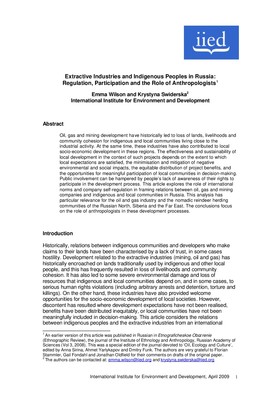Extractive Industries and Indigenous Peoples in Russia: Regulation, Participation and the Role of Anthropologists
Oil, gas and mining development have historically led to loss of lands, livelihoods and community cohesion for indigenous and local communities living close to the industrial activity. At the same time, these industries have also contributed to local socio-economic development in these regions. The effectiveness and sustainability of local development in the context of such projects depends on the extent to which local expectations are satisfied, the minimisation and mitigation of negative environmental and social impacts, the equitable distribution of project benefits, and the opportunities for meaningful participation of local communities in decision-making. Public involvement can be hampered by people’s lack of awareness of their rights to participate in the development process. This article explores the role of international norms and company self-regulation in framing relations between oil, gas and mining companies and indigenous and local communities in Russia. This analysis has particular relevance for the oil and gas industry and the nomadic reindeer herding communities of the Russian North, Siberia and the Far East. The conclusions focus on the role of anthropologists in these development processes.
Cite this publication
Available at https://www.iied.org/g02490
